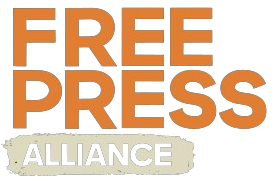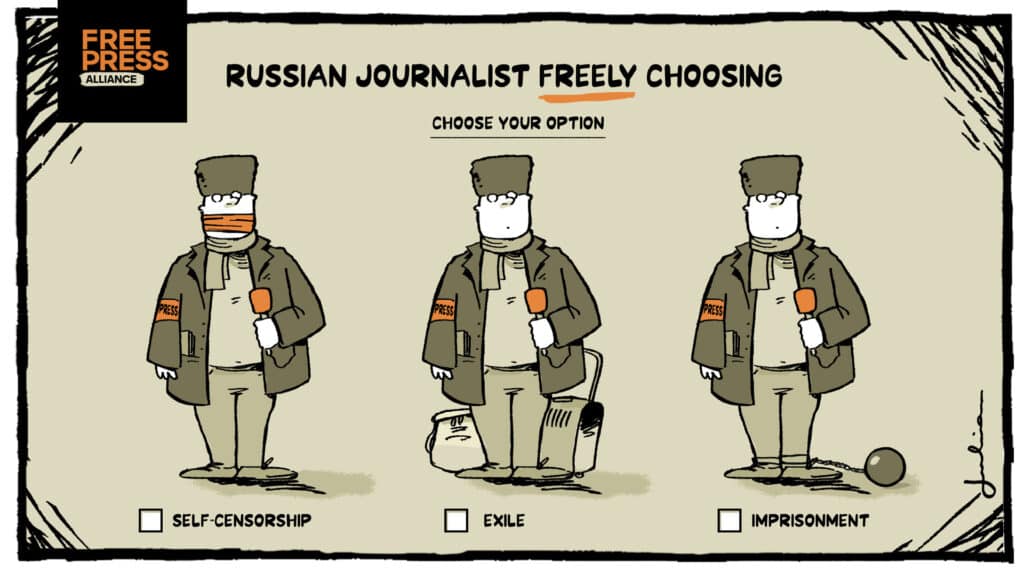Over the past decade, and with growing urgency since the full-scale invasion of Ukraine in 2022, press freedom in Russia has collapsed into one of the most repressive environments for journalists outside of active warzones. The Kremlin’s tightening grip on the media extends far beyond traditional censorship. It now encompasses aggressive legal crackdowns, the criminalization of independent reporting, forced media closures, and the systematic persecution of journalists, both foreign and domestic.
High-Profile Persecution
The case of Evan Gershkovich, a Wall Street Journal correspondent detained in March 2023 while reporting on a military facility, underscores the Kremlin’s willingness to conflate journalism with espionage. Accused under vague national security charges, Gershkovich was imprisoned until August 1, 2024, when he was released as part of a rare prisoner exchange brokered by then President Biden. His case was a rare exception; his arrest sent a chilling signal to both foreign and domestic reporters.
More recently, on May 20, 2025, Russian police raided Bars TV Station and the home of one of its editors, seizing equipment and temporarily suspending operations. The criminal investigation cited alleged defamation, linked to a February report about missing Russian soldiers in Ukraine. Editors also suspect retaliation for the use of the slang term менты, a derogatory word for police, in their coverage.
“This case is directly related to our journalistic work,” Bars’ editorial staff told the Committee to Protect Journalists (CPJ). Such crackdowns are no longer isolated incidents, they are part of a pattern of systematic repression designed to silence dissenting voices and punishing those who report uncomfortable truths.
Legal Tools of Suppression
Russia has institutionalized press repression through a dense web of laws. The notorious “foreign agents” law, first introduced in 2012 and expanded repeatedly, is now used to brand journalists, NGOs, and independent citizens as threats to national security. Similarly, a 2022 law criminalizing any deviation from the official narrative on the Ukraine invasion (officially termed a “special military operation”) has silenced much of the country’s independent media.
Even using the word “war” or sharing casualty figures that differ from the government’s official line is now punishable under vague laws about “discrediting” the Russian army. Hundreds have been fined, detained, or prosecuted under these charges since early 2022.
Exile or Silence
Faced with harassment, censorship, or arrest, many Russian journalists now confront a grim choice: self-censorship, exile, or imprisonment.
A growing number have fled to countries like Latvia, Georgia, and Germany, continuing their reporting from abroad. Outlets like Meduza and Novaya Gazeta, once leading voices inside Russia, now operate in exile, relying on VPN networks and encrypted channels to reach audiences back home. But even these digital lifelines are under threat, as the Kremlin expands its internet surveillance and censor’s foreign platforms.
Inside Russia, the absence of independent journalism is being filled by a flood of state-sponsored propaganda, disseminated through tightly controlled television networks and pro-Kremlin influencers. This results in a distorted media landscape, where critical thinking is discouraged and facts are replaced by ideology.
The Broader Consequences
The attack on press freedom is not only a media crisis, but also a societal one. Without access to independent information, Russian citizens are left vulnerable to state-controlled narratives that justify war, suppress dissent, and delegitimize opposition. The erosion of media independence weakens public accountability and allows those in power to operate unchecked.
The global implications are clear: when truth is criminalized in one of the world’s most powerful states, disinformation and authoritarianism gain ground worldwide.
In the long term, this environment threatens to radicalize opposition, deepen social polarization, and push Russia further into international isolation. It also undermines efforts to build peace, trust, and democratic institutions, both domestically and in the region.
Conclusion
Russia’s ongoing crackdown on independent journalism is a stark warning to the international community about the fragility of truth under authoritarian rule. As domestic voices are silenced, the burden of truth-telling increasingly falls on international media, NGOs, and exiled Russian outlets.
At Free Press Alliance, we stand with the courageous journalists risking everything to report the truth. Now more than ever, global solidarity, pressure, and support are essential to defend what remains of press freedom in Russia, before it disappears entirely.

